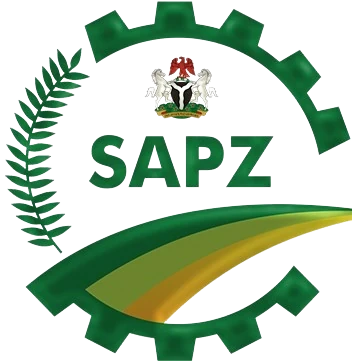1.0 BACKGROUND
The Federal Government of Nigeria has received a facility from the African Development Bank (AfDB), the International Fund for Agricultural Development (IFAD), and the Islamic Development Bank (IsDB) to finance the cost of the Special Agro-Industrial Processing Zones Program (SAPZ). It intends to apply part of the proceeds towards carrying out various consultancy services. The SAPZ Program is being implemented in the seven (7) States and the Federal Capital Territory (FCT). The States are Cross River, Imo, Kaduna, Kano, Kwara, Ogun, and Oyo.
The overall development objective of the SAPZ program is twofold: (1) Support the development of SAPZ in high food production areas to supply the domestic food market and create exportable surpluses; and (2) Capacitate smallholder farmers, small agro-processors, and traders, and community-based service providers, including women and youth; to take advantage of the market demand created by the SAPZ to sustainably enhance their income, household food security and resilience to climate change.
The program has four components, namely:
➢Component 1: Infrastructure Development and Management for Agro-Industrial Hubs (AIHs). Under this AfDB-led component, the program will support the FGN in developing and setting up SAPZs in high-potential states.
➢Component 2: Agricultural Productivity, Production, Market Linkages, and Value Addition in SAPZ Catchment Areas. Under this component, SAPZ’s objective is threefold: (i) support smallholder farmers and small operators to increase their productivity/production and capacity to add value to raw materials on a profitable and environmentally sustainable basis; and (ii) link them to the additional market outlets offered by the Agro-Industrial Hubs (AIHs), off-takers supplying the local and national market who operate in the target area, and small processors/traders supplying the local markets, including primary processors operating in the Agricultural Transformation Centres (ATCs); iii) enhance the resilience and adaptive capacity of smallholder farmers to climate change..
➢Component 3: Policy and Institutional Development Support. The objective of component 3 is to support the development of enabling policies, legislation, and regulation for SAPZs in Nigeria to create a conducive business environment for private sector investment and to address inefficiencies and market failures in agricultural value chains.
➢Component 4: Program Coordination and Management. This component will ensure that the program is efficiently and effectively managed to achieve expected results.
Climate change is significantly affecting agricultural productivity, particularly in regions dependent on rain-fed agriculture. To address these challenges, there is a growing need to implement climate-smart agricultural practices that enhance the resilience and adaptive capacity of farming systems. The integration of Geographic Information Systems (GIS) and remote sensing technology has the potential to provide accurate data, improve decision-making, and enable better management of natural resources
- Objective
Provide GIS and remote sensing services that support the design, monitoring, and evaluation of climate-smart agricultural practices.
Transfer knowledge and skills to local agricultural extension officers, farmers, and other stakeholders through training and capacity-building programs
Identify the specific requirements and challenges faced by farmers in climate-smart agriculture
Development of an easy-to-use mobile data collection application that permits capturing data in the field (with no internet connection) and then uploading it to the database by registered users.
Kindly download the attached document below for more details.
